Former AFL Tasmania boss slams AFL excuses over stand-alone team
Tasmanian-born champion Nick Riewoldt says revelations COVID didn’t hit the AFL as hard as first feared opens the door for movement towards a Tassie team.
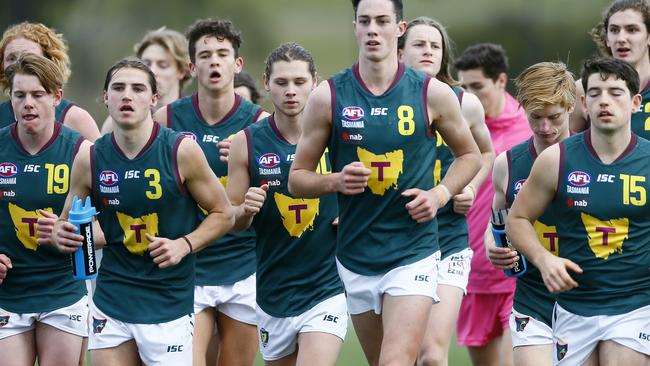
AFL
Don't miss out on the headlines from AFL. Followed categories will be added to My News.
St Kilda great Nick Riewoldt has welcomed a renewed push for a stand-alone Tasmanian side and believes the AFL needs to make a decision in the next few years.
Riewoldt said it was the right time to restart the Apple Isle conversation because the league had revealed it was not as financially battered by the COVID crisis as it first predicted.
“Let’s pick the conversation back up again — because it had momentum last year and it was tracking in a really positive direction,” Riewoldt told News Corp.
“This has gone past sentiment and emotion.
“There’s a proofed-out model, bringing commercial minds together that have run all the numbers and a government that is eager and willing — so let’s not lose the momentum that was captured last year.”
Kayo is your ticket to the best sport streaming Live & On-Demand. New to Kayo? Get your 14-day free trial & start streaming instantly >
Riewoldt, who was born in Hobart and was a member of Tasmania’s AFL Taskforce, said Hawks president Jeff Kennett was “sensible and on the money” in saying the league was four of five years away from being able to introduce a new side.
“But you can’t say we’ll make the decision in four or five years … because then you are talking over a decade,” Riewoldt said.
“There’s not necessarily a need to make a decision tomorrow, but the conversation needs to continue to a point that decisions can be made within the next few years.”
RELATED: HOW TASSIE NEGLECT WILL IMPACT GIL’S LEGACY
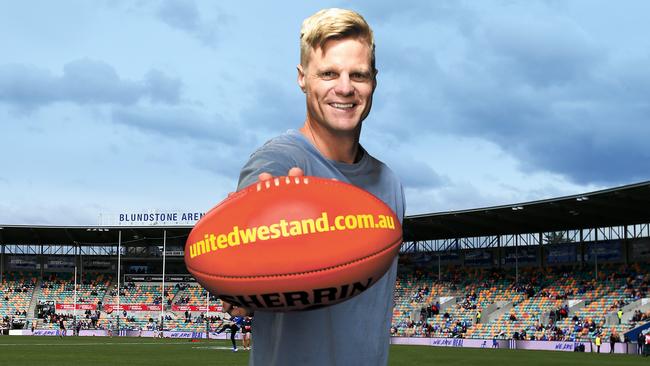
The taskforce-motivated push for an expansion club was taken off the table once COVID hit this year.
But Riewoldt said the taskforce had not changed its position or its recommendation that a new Tasmanian side would be a “value add to the competition rather than a potential drain”.
“People can bang on with the emotion all they like but there’s a pretty substantial document there that involves some very successful people with significant commercial backgrounds that think a Tasmanian side will be valuable addition and a huge contributor to the national game.
“And this would truly make it the national game.”
Scott Wade, a former Hawthorn and Tasmanian State of Origin rover, was AFL Tasmania’s chief executive for nearly 17 years, says the only thing standing in the way of a stand-alone AFL team was the AFL itself.
“I have been saying consistently is if the AFL Commission wanted Tasmania to have a team, we’d have one tomorrow,” Wade said.
“You can skirt around the edges, but the AFL Commission don’t want Tasmania to have a team.”
Wade said league HQ was supportive of Tasmanian football during his time in charge.
“But they have never really been prepared to address the elephant in the room (a Tasmanian AFL team),” he said.
“(Former AFL CEO) Andrew Demetriou was really clear and concise under his reign.
“They were going towards two teams in NSW and Queensland and Tassie was the next cab off the rank.
“But I haven’t seen any evidence that the current AFL commission is one bit interested in Tassie being the next cab off the rank.”
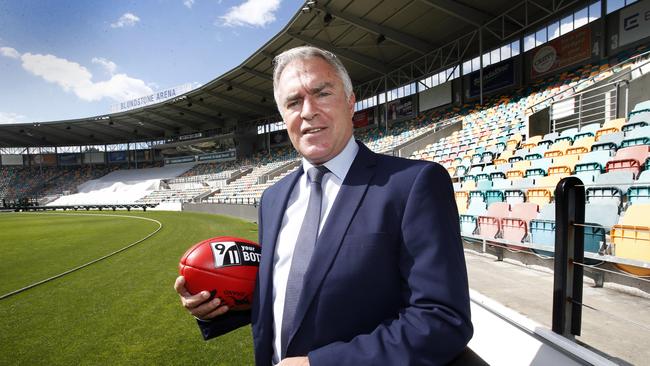
He was in charge when the code was governed by an independent board, which included the likes of Richmond chief executive Brendon Gale and multiple AFL club recruiting guru Scott Clayton.
But in April 2015, the board dissolved itself and handed full control over to the AFL, as was the setup in other states.
Less than a year later Wade was shown the door.
He was replaced by Rob Auld, brother of the AFL’s general manager of clubs and broadcasting Travis Auld, who was promoted to AFL House after less than two years, with the game in a crisis as Devonport and Burnie withdrew from the state league, and then Trisha Squires who moved to become Head of AFL Queensland after a tumultuous two-and-a-half years in charge.
“I was forced out because they didn’t want anyone leading Tasmanian football who wanted to passionately fight for Tasmania,” said Wade, the father of Test batsman Matthew and uncle of Collingwood star Jeremy Howe.
“They wanted a person that would toe the corporate line.”
Wade said the Hawthorn and North Melbourne playing home games in Tasmania have done nothing for the growth of the game, saying in fact it has gone immeasurably backwards since the Hawks’ first home game in Launceston in 2001.
Wade believes Tasmania and the AFL missed opportunities in the late 1980s when the competition expanded to include the West Coast Eagles and the Brisbane Bears, and again in the early 1990s with Fitzroy playing home games in Hobart in a late bid for survival before being forced north to merge with the Bears after the 1996 season.
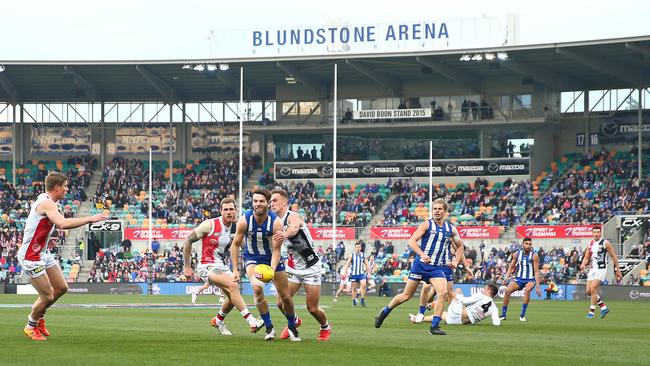
He said a Tasmanian AFL team would reinvigorate the code in the state, bringing the same passion and pride as West and South Australians feel for the Eagles, Dockers, Crows and Power, and have the same impact on the state that Geelong does in its region.
But he believes without one, Tasmanian football would continue to spiral downwards.
“Community club footy will survive, clubs are resilient, but it just won’t be of any quality,” he said.
“All of our young talent will basically end up on the mainland. Those that are pursuing an AFL dream will go elsewhere and we will never see them again back in the state.
“The AFL has sucked all the talent out of Tasmania and given nothing back.”
KENNETT: TASSIE TEAM 4-5 YEARS AWAY
Hawthorn president Jeff Kennett says the Hawks support Tasmania’s “aspirations” for a stand-alone AFL club but believes the league is “four or five” years away from being able to sustain it.
Kennett said Hawthorn had begun talks over an extension to its deal to play four “home” games a year in Launceston.
The $4 million-a-season arrangement, backed by the Tasmanian Government, expires at the end of next season.
North Melbourne’s deal to play “home” games in Hobart also has a year to run.
“Discussions have started between the bureaucrats in Tassie and some of the administrators at Hawthorn, but they are very early stages,” Kennett said.
“There is no suggestion of what shape and form that may take yet.”
But reworked deals for Victorian teams to play games on the Apple Isle are likely to be the last, with Tasmanian officials stiffening their resolve to secure their own licence.
The new contracts could include bridging clauses, directly linking the extensions to Tasmania’s entry into the AFL competition as soon as 2025.
While AFL chiefs remain noncommittal, support for a Tasmanian team among rival club bosses had grown prior to the COVID financial crisis.
“We have joined with the Tasmanian Government in their aspirations,” Kennett said.
“We have said that we will help them if we can, if there is a practical way that we can help. We are not opposed to the concept.”
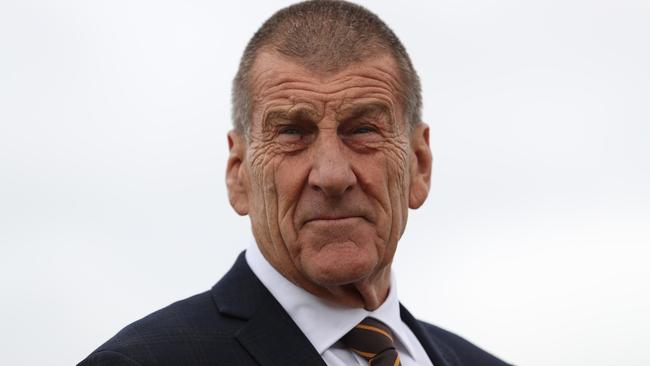
Asked if it was a matter of “if not when” Tasmania got its own team, Kennett said: “Well, to go from no team to a team is more than when. A whole lot of things have got to be put in place and it’s not entirely up to Tasmania.
“So it’s not a matter of when, it’s a matter of if it is going to be when, how is it going to be executed? Does that mean a 19th team in the AFL?
“I have no idea what the AFL’s position on it is.
“I think (Tasmanian Premier) Peter Gutwein is talking in the next four or five years and by then hopefully the economy will have recovered and we will have been playing AFL games as per normal and the AFL can be rebuilding their financial base.
“But right now, the concept of a 19th team anywhere — when 12 teams are assisted by the AFL just to meet their operating costs — is just not an option.”
Kangaroos chief executive Ben Amarfio said: “North Melbourne has expressed its desire to begin discussions on an extension of its current agreement with Spirit of Tasmania (TT-Line) that incorporates four homes games to be played at Blundstone Arena, each season.
“North truly values its long-term partnership with Spirit of Tasmania and is committed to becoming the number one sports and entertainment offering in Tasmania.”
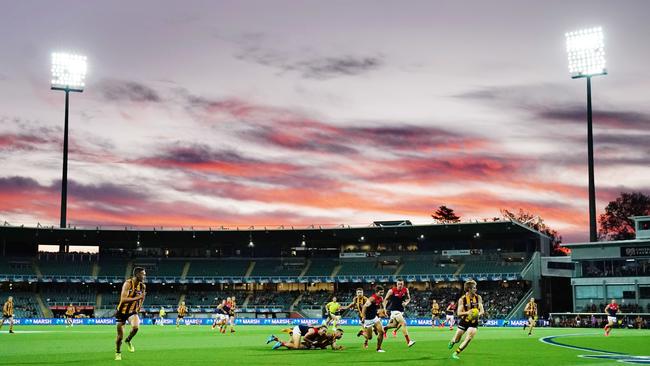
TASMANIA’S ULTIMATUM TO THE AFL
Tasmania has dramatically drawn a line in the sand and threatened to abandon its push for a stand-alone team unless AFL chiefs commit to a “pathway”.
The taskforce behind a bid for a Tasmanian team is losing patience with the league’s indifference and warned the state will soon begin redirecting funds and energy into basketball.
Taskforce chair Brett Godfrey, who has held talks in recent weeks with AFL chief executive Gillon McLachlan, told News Corp: “If there is no committed pathway to a team then the Government probably needs to review its entire sports tourism strategy and consider if and where the AFL sits within that plan.”
Godfrey says football in Tasmania, one of Australian rules founding states, is facing “death by irrelevance”.
Tasmanian Premier Peter Gutwein said the Government remained 100 per cent committed to obtaining an AFL team, but did not specify between a new or existing licence.
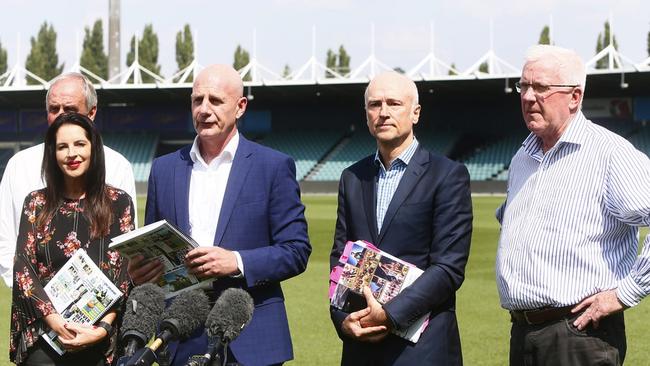
“This week I wrote to AFL CEO Gill McLachlan to progress the conversation regarding a Tasmanian AFL licence and the work of the Tasmanian AFL taskforce,” Gutwein said.
“The Tasmanian Government is a tremendous supporter of AFL content in the State and welcomes ongoing discussions with the AFL on a transitional pathway to our own licence and a Tasmanian team.”
The AFL Taskforce has made a number of recommendations to the Tasmanian Government as it believes it has hit a dead end in the quest to finally land the state its own AFL team.
The Taskforce also believes the code will no longer be Tasmania’s favourite sport within a decade without an AFL team.
Hawthorn and North Melbourne receive a combined $8 million a year from the Tasmanian Government to play four home games a season in Launceston and Hobart respectively.
Hawks boss Jeff Kennett told News Corp his club had joined Tasmania’s aspirations for its own team but believed the COVID crisis meant the league could not sustain a 19th team for “four or five years”.
Both contracts are due to expire at the end of next season.
Tasmania’s preference is to start its own team from scratch rather than secure an existing licence.
Godfrey said the deals with Hawthorn and North Melbourne had delivered benefits to Tasmania, but questioned their worth going forward as more and more Tasmanians turned away from the AFL.
“All governments have limited resources and the more pressing question needing addressing is ‘are these deals the best use of those funds?’,” he said.
The Taskforce was originally tasked at building a case for a 19th licence, but expansion is now off the table post-COVID and the financial hit the AFL had received with relocation of an existing team now the most viable option.
Basketball has been proactive in the state, with NBL owner Larry Kestelman announcing Tasmania will re-join the NBL next year as the JackJumpers.
Godfrey said this move showed the difference in attitude between the sports and as a results basketball would reap the rewards.
“Basketball, for instance, exhibits rapid grassroots relative growth and on current trends, is likely to exceed AFL in participation, by the end of this decade,” Godfrey said.
“There comes a point in any business, and I would include AFL, that declining market interest requires reinvention and renewal or death by irrelevance.”
He said he genuinely fears for the sport’s future in a state that has produced four Australian Football Hall of Fame legends and countless other stars for the game.
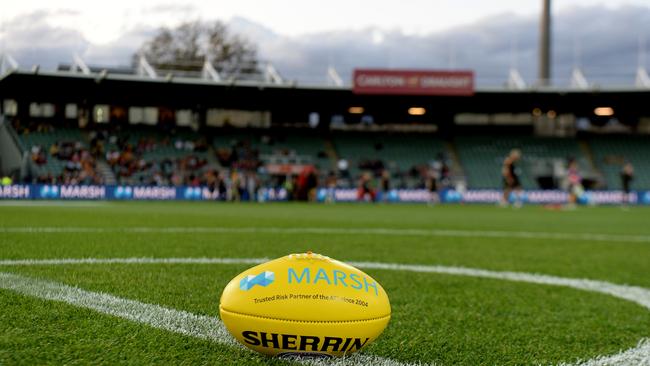
“Twenty year ago, Tasmania had the highest per capita participation in the country,” Godfrey said.
“It is bottom of the pack today and declining.
“Our review of expansion clubs since the VFL morphed into the AFL, clearly demonstrates that the AFL licence drives both engagement and participation.
“Without trying to sound emotive, a pathway to a team has been sought for 25 years or more.
“If such a big-ticket solution isn’t grasped now, no one should be surprised by the outcome.
“The Taskforce predicted and still predicts, that AFL will lose its mantle as the state’s most popular sport, by the end of this decade.”
The Taskforce is made up of Virgin Australia co-founder Brett Godfrey, former St Kilda captain Nick Riewoldt, former Woolworths boss Grant O’Brien, former Greater Western Sydney finance boss Paul Erikkson, executive chairman of Dynamic Sports and Entertainment Group James Henderson, Tasmanian businessman Errol Stewart and Lauderdale president Julie Kay.
Originally published as Former AFL Tasmania boss slams AFL excuses over stand-alone team


